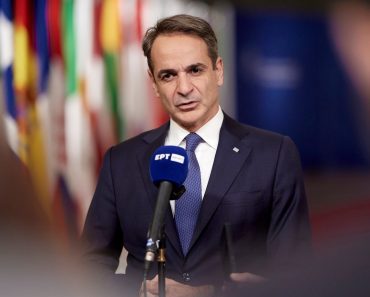This article is an on-site version of our Europe Express newsletter. Sign up here to get the newsletter sent straight to your inbox every weekday and Saturday morning. Explore all of our newsletters here
Welcome back. In what media outlets in Athens are calling a landmark ruling, the European Court of Human Rights this week found Greece guilty of violating the rights of a would-be asylum seeker.
What are the implications for Europe’s asylum and migration policies, which are already — to put it mildly — in considerable disarray? I’m at tony.barber@ft.com.
Illegal ‘pushbacks’
The ECHR case involved a Turkish woman who entered Greece in 2019, hoping to claim asylum on the grounds that Turkey’s authorities were persecuting her as a follower of the Islamic preacher Fethullah Gülen.
In Greece, she was detained and put on a boat back to Turkey. She was arrested the next day.
The court didn’t just condemn this as an illegal forced expulsion. It said there were “strong indications to suggest that there had existed, at the time of the events alleged, a systematic practice of ‘pushbacks’ of third-country nationals by the Greek authorities . . . to Turkey”.
Pushbacks breach the international human rights principle of non-refoulement, which rejects the forcible return of refugees to places where their lives or liberties are in danger.
Since the European refugee and migrant emergency of 2015-2016, there have been numerous allegations that frontline EU countries such as Greece, as well as Frontex, the EU’s border control agency, have been complicit in pushbacks.
But the ECHR ruling marks the first time that the court has upheld such charges against Greece — which, like Frontex, denies it has done anything wrong.
Rule of law
The ECHR’s conclusion that Greece was probably engaged in “systematic” pushbacks of asylum-seekers is a grave embarrassment to the EU. That’s because the EU has taken a lenient, even supportive line on Greece’s behaviour.
In March 2020, European Commission president Ursula von der Leyen visited the Greek-Turkish border and lavished praise on the Greek authorities for being “our European shield in these times”.
Furthermore, the EU places much emphasis on its role as a defender of the rule of law, with regard to the behaviour of its 27 member states and to its own actions on the international stage. This is, if you like, part of the EU’s brand.
Without doubt, EU leaders see it as an urgent political priority to curb irregular migration — although, as I shall explain below, this is only one element of a larger, more complex set of questions around migration in general.
The ECHR ruling serves a reminder that there are legal, ethical and humanitarian dimensions to Europe’s migration and asylum policies that, whether they like it or not, EU leaders must take into account.
Is any European government or political party so frustrated with the ECHR’s interpretation of asylum-seekers’ rights that, like some British Conservatives, they want to withdraw their country from its jurisdiction?
Well, there is some dissatisfaction, for sure. But for the moment no EU government wants to join Belarus and Russia, the only European states outside the ECHR.
The role of Frontex
Meanwhile, Frontex has other questions to answer.
On Wednesday, the EU’s data protection unit reprimanded Frontex for carelessly sharing information about people suspected of cross-border crimes with Europol, the EU’s law enforcement agency.
In 2022, Olaf, the EU’s anti-fraud office, issued a damning report that criticised Frontex for misconduct and mismanagement. Frontex acknowledged some individuals’ misbehaviour, but said these were “practices of the past”.
Clamping down on irregular migration
As these controversies suggest, irregular migration continues to preoccupy Europe. Yet the numbers involved have been going down in recent times.
In 2015, Frontex recorded more than 1.8mn irregular crossings into the EU — mostly, people fleeing conflicts in Afghanistan, Iraq and Syria.
Between January and November 2024 — the latest spell for which figures are available — the number dropped 40 per cent from the same period of 2023 to just over 220,000.
As we see in the Frontex map below, there was a sharp fall in arrivals across the central Mediterranean. The EU’s border security agency attributes this mainly to “preventive measures by the Tunisian and Libyan authorities to disrupt the activities of smugglers”.

By contrast, arrivals on the west African route reached their highest levels since at least 2009. Frontex explains this with reference to “the deteriorating security and humanitarian situation” in areas of west Africa, where the agency says criminal networks are expanding their operations.
Overall, it seems likely that the EU’s policy of striking multibillion-euro deals with governments in north Africa and the Middle East — financial support in return for tougher border controls — have achieved some results.
However, success has come at a price. This UN report on Tunisia details allegations of “dangerous manoeuvres when intercepting migrants, refugees and asylum-seekers at sea; physical violence, including beatings, threats of use of firearms; removal of engines and fuel; and capsizing of boats”.
Angst over asylum
Reduced numbers of irregular crossings are doing little to lower the political heat on EU leaders arising from the migration issue.
One reason is the ineffectiveness of European asylum policies — on which I recommend this excellent in-depth article by Julia Monn for the Neue Zürcher Zeitung.
She makes the point that about 6.8mn asylum-seekers have come to Europe since 2015. More than 3.6mn have been ordered to leave — but only 1mn have actually left.
Why is this? Partly because it all depends on whether the EU has a readmission agreement with the country from which an asylum seeker comes. The EU has such accords with, for example, Albania and Georgia, but not with Afghanistan, Bangladesh or Syria.
A second problem is that, under EU rules, a government can apply to remove a rejected asylum seeker to the country in which they first entered the bloc’s border-free Schengen area. But nowadays few countries abide by these rules.
In 2023, European governments submitted almost 200,000 applications to remove people, but only 19,000 resulted in their transfer to the country where they arrived, Monn writes.
Most European states display no appetite for accepting rejected asylum-seekers. They know that there is little realistic prospect of returning them to their home country if there’s no repatriation agreement. As a result, the whole system is gummed up.
National security
For some EU states, asylum has become a matter of national security.
Poland’s government last year temporarily suspended the right to asylum, mainly to deter migrants arriving from Belarus. It is also building a wall to seal its border with its eastern neighbour.

There are good reasons for Poland’s drastic actions. Alexander Lukashenko, the pro-Russian dictator of Belarus, has sponsored people to arrive from the Middle East or Africa and encouraged them to cross the border into Poland.
Migrants and the European labour force
Even in Poland, the government’s tougher line on migrants and asylum-seekers needs to be balanced against the nation’s labour force requirements — as the FT’s Raphael Minder reported from Warsaw in November.
In 2023, Poland recorded its sixth consecutive year of population decline. One state-funded think-tank estimates that the labour market will lose 2.1mn workers by 2035.
In Germany, the independent Bertelsmann Foundation published a study last year that estimated the nation’s labour force would shrink to 41.9mn by 2040 from 46.4mn today, unless some 288,000 skilled foreign workers were admitted every year.
Giles Merritt of the Brussels-based Friends of Europe think-tank says:
Far-right populists have succeeded in inflaming voters across the EU, and now form an anti-immigrant bloc that threatens the Union itself. Member governments have generally made a hash of persuading voters that their economic interest is to rejuvenate and repopulate Europe through immigration and convince them that this far outweighs real or perceived social frictions …
Ageing Europe needs more migrants, not fewer.
The EU’s crumbling asylum pact
In private, some EU governments acknowledge Merritt’s point, but they fear the electoral consequences of saying so explicitly in public.
Instead, they are scrambling for ad hoc solutions such as “outsourcing” asylum policies, using euphemistically named “return hubs” for migrants set up outside the EU.
Kyriakos Mitsotakis, Greece’s prime minister, is among those who question whether such measures can be applied at pan-European level. Italy’s arrangements with Albania have already run into legal difficulties.
It might help if the EU could make a success of its laboriously negotiated Migration and Asylum Pact, due to come into effect next year — but already some governments are trying to unpick that agreement.
To sum up, the EU seems no closer to striking a balance between curbing irregular migration, operating effective asylum policies, keeping open legal pathways for migrant workers and persuading voters that all this amounts to a coherent plan.
The EU pact on migration and asylum — an analysis by Carmen González Enríquez for Spain’s Elcano Royal Institute
Tony’s picks of the week
-
Guangzhou FC, once China’s leading football club, has been dropped from the national league in the latest blow to the authorities’ hopes of achieving global success in the sport, the FT’s Thomas Hale and Gloria Li report
-
Jean-Marie Le Pen, who has died at the age of 96, was an unapologetic nationalist who despised the less abrasive style that has made his daughter Marine’s party the dominant force on the French right, Arthur Goldhammer writes in his Tocqueville21 blog








